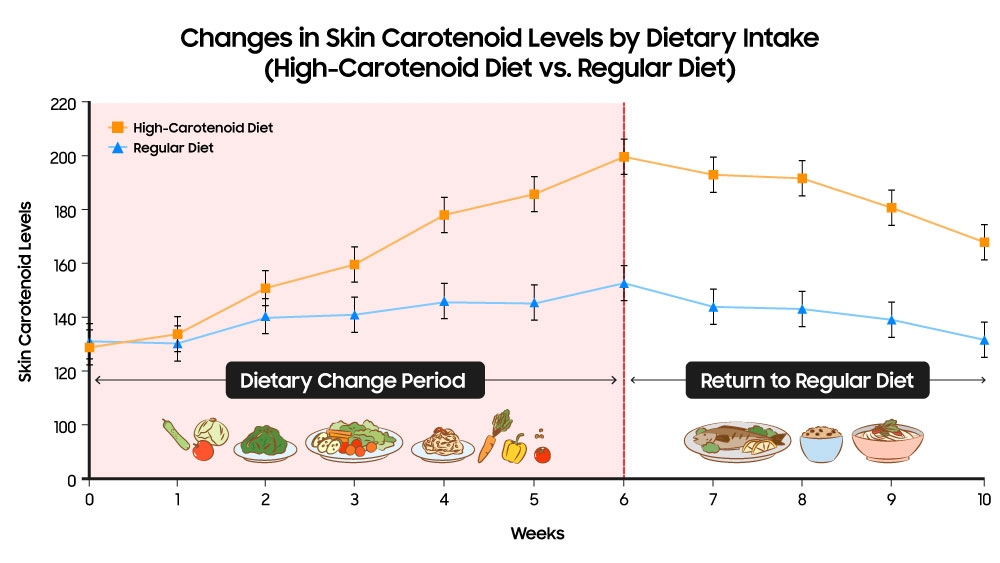Aging is not fixed — it can speed up or slow down depending on diet and lifestyle. That’s why healthy aging has become a growing focus in recent years.
Antioxidants play a key role in this process, helping neutralize free radicals and protect the body from oxidative stress. The Galaxy Watch8 series debuts Antioxidant Index — the first smartwatch feature to measure the body’s antioxidant status and support more effective health monitoring.
Samsung Newsroom spoke with Hyojee Joung — President of the Korean Nutrition Society and professor at Seoul National University (SNU), who participated in developing and validating the new feature — about this breakthrough and the importance of antioxidant care.

▲ Hyojee Joung
Why Antioxidant Care Matters
“Why do I feel tired so easily?”
Free radicals are natural byproducts of energy production in the body, but unhealthy habits can cause them to build up. “Tobacco use, alcohol consumption, poor diet, UV exposure and stress drive overproduction — triggering oxidative stress and accelerating aging,” said Joung.
Persistent exhaustion may signal excess free radicals in the body. “They can weaken immunity, cause fatigue and speed up visible signs of aging such as wrinkles or pigmentation,” Joung explained. “As oxidative stress accumulates, the risk of chronic diseases such as type 2 diabetes and certain cancers increases — making antioxidant management essential.”

▲ Excessive free radicals from an unhealthy lifestyle can raise the risk of chronic disease.
“Antioxidant capacity isn’t a matter of youth or fitness — it requires consistent care throughout life,” Joung emphasized, noting that daily fruit and vegetable intake is the easiest and most effective place to start.
Fruits and vegetables are rich in antioxidants such as carotenoids and vitamins C and E. Because the body’s natural production of antioxidant enzymes declines with age, sufficient dietary antioxidant intake provides the foundation for sustainable health.
However, for most people, it’s not easy to objectively assess whether their everyday diet is truly balanced. The Galaxy Watch8 series’ Antioxidant Index was developed to address this challenge.
Tracking Antioxidant Levels With Galaxy Watch8 Series
“Is my diet healthy enough?”
For anyone wondering how healthy their diet is, Samsung Health now offers a quick answer. Using rear sensors, the Galaxy Watch8 series measures an Antioxidant Index — based on carotenoid levels in the skin — to assess fruit and vegetable intake within seconds.
“Carotenoids are the red, yellow and green pigments in fruits and vegetables,” said Joung. “Because the human body cannot produce them, carotenoid levels reflect dietary intake.”
The Galaxy Watch8 series uses a reflection spectroscopy sensor. When light of a specific wavelength shines on the skin, carotenoids absorb some and reflect the rest. By analyzing the reflected light, the device estimates carotenoid levels.
Previously, measuring antioxidant levels required blood samples and complex laboratory procedures. Now, users can simply place a thumb on the back sensor for five seconds to see instant results. Based on the World Health Organization’s (WHO) daily recommendation of 400 grams of fruits and vegetables, results appear as:
- Very low – Less than 50% of the recommended intake
- Low – 50% to less than 100% of the recommended intake
- Adequate – 100% or more of the recommended intake

▲ Joung measures her Antioxidant Index with Galaxy Watch8 Classic.
Joung explained that although Antioxidant Index does not represent the body’s full antioxidant capacity, it serves as a practical and meaningful indicator of daily antioxidant status by reflecting carotenoid intake from fruits and vegetables — major sources that help strengthen the body’s antioxidant system.
Antioxidant Index: A Reliable and Validated Health Indicator
“How should I respond to my Antioxidant Index reading?”
The Galaxy Watch8 series is the first smartwatch to measure antioxidant levels — a breakthrough built on years of research. Samsung began collaborating with Joung and her team in 2018 to explore how this capability could be applied to wearables.
A dietary intervention study conducted by the Graduate School of Public Health at SNU confirmed that skin carotenoid levels reliably indicate fruit and vegetable intake. “Over six weeks, we provided meals with varying carotenoid content to 80 participants and observed their skin carotenoid levels increased within one to two weeks,” Joung said.

▲ Results from a dietary intervention study with 80 participants at SNU
When users measure their Antioxidant Index, the Samsung Health app provides feedback such as “Have one more tomato today” or “Try 50 grams of pumpkin.” These recommendations are based on proposals from Joung’s team. “It’s important to give dietary guidance in language users can easily understand,” she explained. “We created the foundational data that trained an algorithm to adapt suggestions to individual preferences.”
The research team plans to keep refining the feature to deliver more accurate insights and support more effective antioxidant management.
Tips for Using Antioxidant Index
Joung shared four tips for making the most of the Galaxy Watch8 series’ Antioxidant Index.
① Consistency is key — don’t worry about daily fluctuations.
Unlike blood glucose, Antioxidant Index does not change immediately. A day or two of eating more fruit will not raise the score right away. With steady habits, improvements usually appear after one to two weeks. Alcohol, excessive exercise and stress may cause temporary dips, but levels typically recover — so focus on small, sustainable changes.
② Measure at the same time, with the same finger.
For accuracy, measure at a consistent time each day — such as after waking, before bed or after lunch — and always with the same finger, like the right or left thumb.
③ Check results alongside other Samsung Health indicators.
Antioxidant levels are linked not only to diet but also to sleep and stress. Checking Antioxidant Index with sleep quality and stress data provides a more holistic view of health.
④ Eat a variety of fruits and vegetables.
To reach the WHO’s recommended 400 grams per day, add colorful fruits and vegetables such as tomatoes, carrots and bell peppers. A broader mix of colors can deliver greater antioxidant benefits, even at the same quantity.
Small Steps, Big Changes
“Whenever I meet someone, I have them try Antioxidant Index. It’s fun to see their surprise at how quickly the results appear,” said Joung, an active Galaxy Watch8 Classic user. “Being able to check instantly is a huge advantage.”
“Many people try to manage antioxidants for disease prevention and healthy aging, but there hasn’t been a clear way to track progress,” she continued. “Antioxidant Index not only shows whether fruit and vegetable intake is sufficient but also raises awareness of the importance of antioxidants — and that alone is meaningful.”
“What matters is consistency, not perfection. Even small steps, like adding one serving of fruits or vegetables to your meal, can create meaningful change over time,” Joung emphasized. “I’m truly happy to see such an innovative feature come to life before my retirement.”
Antioxidant Index delivers results in just five seconds — a simple step toward better health. In the second part of this series, Samsung Newsroom will hear from one of the Galaxy Watch8 series’ developers who helped make this groundbreaking feature possible.













